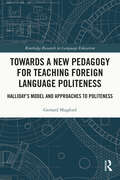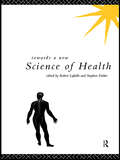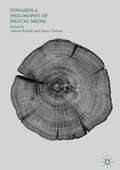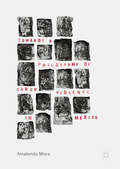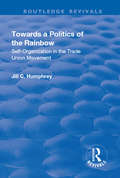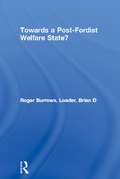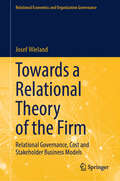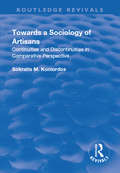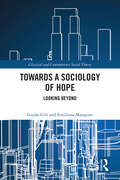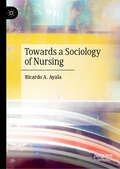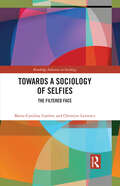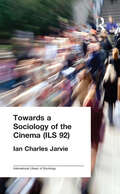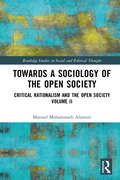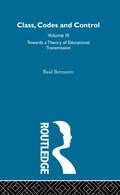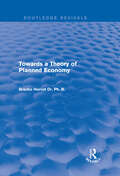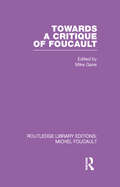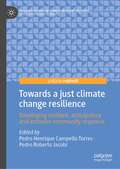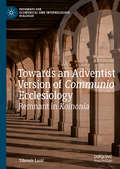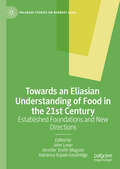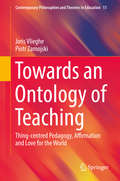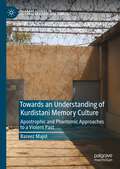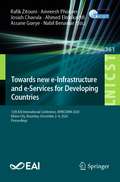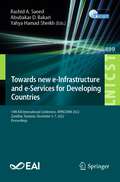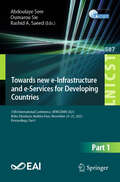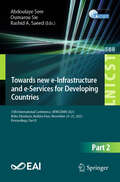- Table View
- List View
Towards a New Pedagogy for Teaching Foreign Language Politeness: Halliday’s Model and Approaches to Politeness (Routledge Research in Language Education)
by Gerrard MugfordThis book examines how foreign language speakers establish and maintain social and transactional relationships in their target language, and how pedagogic intervention can help learners implement practices that will allow them to participate and react in both socially acceptable and individualistically empowering ways. Arguing that ‘doing’ foreign-language politeness and culture does not simply involve the indiscriminate and uncritical adoption and implementation of target-language patterns and practices, the author advocates instead for active, judicious and even critical social action. As such, the book presents a dynamic and vibrant dimension to target language politeness and cultural practices, demonstrating that raising learners’ critical language awareness in identifying productive communicative resources and assets can lead to successful interpersonal and transactional communication. Building on this notion of a ‘positive’ pedagogy, Halliday’s model of ideational, interpersonal and textual is utilised as a framework for exploring how foreign language users can approach target language politeness in terms of prosocial, interpersonal and contested politeness, with reference to a study of Mexican speakers of English as a foreign language. Heightening awareness of foreign language politeness patterns and practices, as well as presenting knowledge and resources for overcoming challenges and accentuating benefits of a nuanced learning scheme for politeness in foreign language, this book will appeal to language educators, researchers and bilingual speakers. It will also benefit those working across pragmatics, sociolinguistics, TESOL, cultural studies.
Towards a New Science of Health
by Stephen Fulder Robert LafailleThe foundations of health sciences need rethinking. The mechanistic biomedical model, apparently so successful in the past, is now criticised for failing to explain what health is and how it can be preserved. The world's major health problems no longer seem so controllable. A new science of health is needed, a radical spirit of inquiry which draws on a broad knowledge base and a variety of approaches, a science which does not balk at reconceptualising health and building on innovative research. Towards a New Science of Health provides a radical alternative to current biomedical thinking. Presenting an overview of all major paradigms in the health sciences, their historical development, socio-cultural background and value, the book provides a framework for innovative thinking in health. Drawing on a range of disciplinary perspectives and focussing on a variety of approaches - systems theory, human experience and biography, the healing process and social relations - the authors aim to bridge the gap between personal experience and scientific knowledge.
Towards a Philosophy of Digital Media
by Alberto Romele Enrico TerroneThis book uses the conceptual tools of philosophy to shed light on digital media and on the way in which they bear upon our existence. At the turn of the century, the rise of digital media significantly changed our world. The digitizing of traditional media has extraordinarily increased the circulation of texts, sound, and images. Digital media have also widened our horizons and altered our relationship with others and with ourselves. Information production and communication are still undoubtedly significant aspects of digital media and life. Recently, however, recording, registration and keeping track have taken the upper hand in both online practices and the imaginaries related to them. The essays in this book therefore focus primarily on the idea that digital media involve a significant overlapping between communication and recording.
Towards a Philosophy of Narco Violence in Mexico
by Amalendu MisraThis book explores the politics of narco-killing and public attitudes to violence and death in the Mexican Drug War. It examines questions such as the culture of human sacrifice, the religious principles that sanction egregious violence and most importantly the society's complex response strategies towards such violence. Primarily a philosophical reflection, this study nonetheless uses anthropological, architectural and sociological methods to provide an interdisciplinary explanation to the visceral, commonplace violence taking place in contemporary Mexico.
Towards a Politics of the Rainbow: Self-Organization in the Trade Union Movement (Routledge Revivals)
by Jill C. HumphreyThis title was first published in 2002: The trade union movement in twentieth-century Britain has been a cornerstone for society’s marginalized members - women, disabled people, lesbians and gay men and people from black and ethnic minority communities. As these groups of workers self-organized to reform their unions, they built a bridge between the old social movement based around class position and labour identity and the new social movements based around civil rights and status stratifications. This book presents a detailed look at self-organization within public sector unions through the emergence of four self-organized groups within NALGO and later, UNISON. Drawing upon unique insider knowledge of the alliances and antipathies between the self-organized groups and the host union, the book also provides fascinating revelations of the tensions between self-organized groups themselves. This study will be essential reading for students of political sociology and industrial relations.
Towards a Post-Fordist Welfare State? (The\state Of Welfare Ser.)
by Roger Burrows Brian D LoaderThere is no doubt that significant socio-economic changes have occurred over the last twenty years in the UK and other advanced capitalist societies. Consequently, Fordism, a bureaucratic, hierarchical model of industrial development has matured into Post-Fordism, with its greater emphasis on the individual, freedom of choice and flexibility, generating fresh debate and analysis. Towards a Post-Fordist Welfare State represents leading authors from a number of disciplines - social policy, sociology, politics and geography - who have played a key role in promoting and criticising Post-Fordist theorising and presents a thorough examination of the implications of applying Post-Fordism to contemporary restructuring of the British welfare state. The work will appeal to a wide-ranging readership providing the first social policy text on Post-Fordism. It will be key reading for undergraduates, postgraduates and lecturers in social policy and administration, sociology, politics and public sector economics
Towards a Relational Theory of the Firm: Relational Governance, Cost and Stakeholder Business Models (Relational Economics and Organization Governance)
by Josef WielandThis book lays the groundwork for a relational theory of the firm as a network of stakeholder resources and interests. Drawing on the author’s earlier publications on relational economics as the political economy of a global cooperative economy or stakeholder capitalism, it explores the governance and managerial implications of a relational economy for firms, while also critically revisiting the traditional and resource-based view of the firm. In turn, it explains concepts such as relational governance, relational costs, relational spaces, rent from cooperation, and shared value creation, as well as a dynamic and process-oriented relational business model. The book discusses the epistemological and methodological prerequisites of a relational theory of the firm and addresses their theoretical taxonomy. A relational theory of the firm is a work in progress; the book represents an invitation to join this theoretical and empirical undertaking.
Towards a Sociology of Artisans: Continuities and Discontinuities in Comparative Perspective (Routledge Revivals Ser.)
by Sokratis M. KoniordosThis title was first published in 2001. A comparative sociological examination of artisans, exploring historical examples and theoretical references to the stratum. The book also investigates empirical case studies and analyzes the variegated careers of contemporary artisans.
Towards a Sociology of Hope: Looking Beyond (Classical and Contemporary Social Theory)
by Emiliana Mangone Guido GiliWhy does hope appear in certain epochs and places, only at other times to disappear from people’s lives and from society as a whole? This book addresses hope from a sociological perspective, offering a theoretical framework and a set of concepts to consider a range of questions. With attention to who the historical bearers of hope are, and which social groups are most inclined towards hope and why. It also considers the objects and goals towards which their hope is directed and the conditions under which hope is easier. An enquiry into the relationship between hope and social, cultural, economic and political conditions, this volume redirects the sociological gaze towards the discovery of social experiences in which hope resurrects and contributes to the imagination of a new social world. It will therefore appeal to scholars of sociology and social theory with interests in the emotions, social practices and social movements.
Towards a Sociology of Nursing
by Ricardo A. AyalaTowards a Sociology of Nursing offers fresh insights from recent research into the nursing profession. Nurses represent an important part of the professionally trained female workforce and, being a middle-class profession, changes in nursing reflect changes of many working women worldwide. Scholarship addressing these changes, however, often consists of narratives of nurses talking about themselves, which can be enriched by a sociological background that foregrounds hypotheses.In this book, Ricardo A. Ayala problematises the realities which inform, affect and shape nursing, offering new perspectives on the consequences of those social realities for the nursing profession and society more broadly. He draws on extensive field research with nurses in the workplace, spending time with them, interviewing key actors and reading and analysing documents critically through a distinctive sociological lens.
Towards a Sociology of Selfies: The Filtered Face (Routledge Advances in Sociology)
by Maria-Carolina Cambre Christine LavrenceThis book examines selfies as a relational and processual networked social practice, performed between people within digital contexts and that involve online/offline intersections and tensions. It offers an analysis of selfies through a rich and interdisciplinary framework, that explores the ritualized and affective engagements selfies provoke from others. Given that selfies by definition are shared and posted through networked platforms, they complicate notions of traditional photographic self-portraiture. As such, this book explores how selfies invoke broader, stratified patterns of looking that are occluded in discourses of "empowerment" and "visibility", as well as the subjectivities these networked practices work to produce. Drawing on extensive qualitative research conducted over a period of three years, this book questions not only what selfies are but what they do, they worlds they create, the imaginaries that organize them, and the flows of desire, affect and normativity that underpin them, questions that can only be addressed through research that closely attends to the experience of selfie-takers. It will be of interest to those working in the fields of Sociology, Cultural studies, Communications, Visual Studies, Social Media studies, Feminist research and Affect Theory.
Towards a Sociology of the Cinema: A Comparative Essay On The Structure And Functioning Of A Major Entertainment Industry (International Library of Sociology)
by Ian Charles JarvieFirst published in 1998. Routledge is an imprint of Taylor & Francis, an informa company.
Towards a Sociology of the Open Society: Critical Rationalism and the Open Society Volume 2 (Routledge Studies in Social and Political Thought)
by Masoud Mohammadi AlamutiThis book applies the general theory of critical rationalism in order to develop a new sociology of the open society, in general, and a new analysis of the transition from a closed society to an open society in particular. It presents a criticism of Karl Popper’s analysis of human action for opening up a closed society, followed by a critical study of the mainstream sociology to show how justificational models of knowledge and rational action have prevented sociology from addressing the contribution of human action to social change. This book provides new sociologies of closed and open societies. It argues that in the closed society "a low level" of critical rationality is activated by people to define the meaning of the good life and social institutions of law, polity and economy. Masoud Mohammadi Alamuti proposes five mechanisms of opening up closed society through the model of social change, inspired by the philosophy of critical rationalism. This volume is "the first systematic attempt" to apply the philosophy of critical rationalism in order to present a "normative sociology of the open society". It will be of interest to postgraduate researchers and professional readers in philosophy, sociology, moral science, law, politics and economics. In addition, this book would benefit research centres, policymakers and civil society activists interested in the ideas of critical rationalism and the open society.
Towards a Theory of Educational Transmissions: Applied Studies Towards A Sociology Of Language (Class, Codes And Control Ser.)
by Basil BernsteinIllustrating the effect of class relationships upon the institutionalizing of elaborate codes in the school, the papers in this volume each develop from the previous one and demonstrate the evolution of the concepts discussed.
Towards a Theory of Planned Economy
by Branko HorvatThis title was first published in 1964: The purpose of the present study is to examine the issues involved in designing an efficient economic system in given historical circumstances.The author draws heavily on the experiences provided by the failures and successes of the postwar Yugoslav economy. The book is one of the first major studies, in English, of the theory of an economy of the Yugoslav type.
Towards a critique of Foucault: Foucault, Lacan and the question of ethics.
by Mike GaneThe work of Michel Foucault, one of the most influential of modern French social theorists and philosophers, has had a dramatic and far-reaching effect on many disciplines. The essays in this reissued collection, originally published in 1986, present Foucault's work as an important contribution to the theoretical analysis of history, language and power. They also represent a critical response to this contribution, encouraging readers not only to read Foucault for themselves, but to think about some new problems in a new way.
Towards a just climate change resilience: Developing resilient, anticipatory and inclusive community response (Palgrave Studies in Climate Resilient Societies)
by Pedro Henrique Campello Torres Pedro Roberto JacobiThis book provides an accessible overview of how efforts to combat climate change and social inequalities should be tackled simultaneously. In the context of the climate emergency, the impacts of extreme events can already be felt around the world. The book centres on five case studies from the Global South, Latin America, Pacific Islands, Africa, and Asia with each one focused on climate justice, resilience, and community responses towards a just transition. The book will be an invaluable reference for advanced undergraduates and postgraduate students, researchers, policymakers, and practitioners in environmental studies, urban planning, geography, social science, international development, and disciplines that focus on the social dimensions of climate change.
Towards an Adventist Version of Communio Ecclesiology: Remnant in Koinonia (Pathways for Ecumenical and Interreligious Dialogue)
by Tihomir LazićThis book explores how Seventh-day Adventists, like other Christians, can benefit from generating their own version of communio ecclesiology. It starts by offering a critical analysis of the status quo of the existing Adventist portrayal of church as remnant, and suggests potential ways of moving this tradition forward. To articulate a more rounded and comprehensive vision of the church’s rich and multifaceted relational nature, this book draws on the mainstream Christian koinonia-based framework. Consequently, it provides possible solutions to some of the most divisive ecclesial issues that Christian communities face today regarding church structure, ministry, mission, communal interpretation, and reform. As it sets on a new footing the conversation between Adventism and other mainstream Christian traditions, the methodology of this book serves as a pathway for any Christian community to use when revisiting and enhancing its own current theologies of the church.
Towards an Eliasian Understanding of Food in the 21st Century: Established Foundations and New Directions (Palgrave Studies on Norbert Elias)
by Jennifer Smith Maguire John Lever Adrianna Kapek-GoodridgeThis edited volume serves as an overview and introduction to the conceptual apparatus of Norbert Elias for newcomers, while also outlining current research within the Eliasian school of sociology. An Eliasian or figurational approach foregrounds process, is sensitive to long-term historical development and changing power relations and is methodologically diverse. Elias’s work is now found across academic disciplines and this volume contains contributions by sociologists, anthropologists, business and management scholars, and those working at the interface of sociology and human geography. Instead of simply highlighting the distinctiveness of the school vis-à-vis other theoretical traditions, this volume outlines how Eliasian inspired work can contribute to important debates on the future of food across academic disciplines.
Towards an Ontology of Teaching: Thing-centred Pedagogy, Affirmation and Love for the World (Contemporary Philosophies and Theories in Education #11)
by Joris Vlieghe Piotr ZamojskiThis book opens an original and timely perspective on why it is we teach and want to pass on our world to the new generation. Teaching is presented in this book as a way of being, rather than as a matter of expertise, which is driven by love for a subject matter. With the help of philosophical thinkers such as Arendt, Badiou and Agamben, the authors articulate a fully positive account of education that goes beyond the critical approach, which has become prevailing in much contemporary educational theory, and which testifies to a hate of the world and to a confusion of what politics and education are about. Therefore, the authors develop the idea of a thing-centred pedagogy, as opposed to both teacher-centred and student-centred approaches. The authors furthermore illustrate their purely educational account of teaching by looking at the writing and the television performance of Leonard Bernstein who embodies what teaching out of love and care for a subject is all about. This book is of interest to all those concerned with fundamental and philosophical questions about education and to those interested in (music) education.
Towards an Understanding of Kurdistani Memory Culture: Apostrophic and Phantomic Approaches to a Violent Past (Palgrave Studies in Cultural Heritage and Conflict)
by Bareez MajidThis book presents a thorough analysis of the Kurdistan Region of Iraq’s memory culture, focusing particularly on commemorations and representations of the Anfal and Halabja atrocities. The author employs a transdisciplinary approach that draws on Memory Studies, Postcolonial Studies, Heritage Studies, Kurdish Studies, Literary Studies and Trauma Studies, to analyze cultural objects such as Kurdistani literary novels, museums, and school curricula. The book introduces two key concepts: the "phantomic museum" and the "apostrophic museum." The former explores the fragile and politicized nature of memories of missing individuals who disappeared during Saddam Hussein's genocidal campaigns and who have never been found, primarily as they return in the Halabja Monument and Peace Museum. The latter examines how the addressing – apostrophizing – of Kurdistan, in and by the Amna Suraka museum in the city of Sulaymaniyah, institutionalizes “official” and highly politicized versions of the past.
Towards new e-Infrastructure and e-Services for Developing Countries: 12th EAI International Conference, AFRICOMM 2020, Ebène City, Mauritius, December 2-4, 2020, Proceedings (Lecture Notes of the Institute for Computer Sciences, Social Informatics and Telecommunications Engineering #361)
by Assane Gueye Rafik Zitouni Amreesh Phokeer Josiah Chavula Ahmed Elmokashfi Nabil BenamarThis book constitutes the thoroughly refereed proceedings of the 12th International Conference on e-Infrastructure and e-Services for Developing Countries, AFRICOMM 2020, held in Ebène City, Mauritius, in December 2020. Due to COVID-19 pandemic the conference was held virtually. The 20 full papers were carefully selected from 90 submissions. The papers are organized in four thematic sections on dynamic spectrum access and mesh networks; wireless sensing and 5G networks; software-defined networking; Internet of Things; e-services and big data; DNS resilience and performance.
Towards new e-Infrastructure and e-Services for Developing Countries: 14th EAI International Conference, AFRICOMM 2022, Zanzibar, Tanzania, December 5-7, 2022, Proceedings (Lecture Notes of the Institute for Computer Sciences, Social Informatics and Telecommunications Engineering #499)
by Rashid A. Saeed Abubakar D. Bakari Yahya Hamad SheikhThis book constitutes the refereed proceedings of the 14th EAI International Conference on Towards new e-Infrastructure and e-Services for Developing Countries, AFRICOMM 2022, which was held in Zanzibar, Tanzania, in December 2022.The 30 papers presented in this volume were carefully reviewed and selected from 78 submissions. The papers are organized in the following topical sections: E-infrastructure; E-Services (Farming); E-Services (Health); E-Services (Social); E-Services (Education); and Advanced ICT.
Towards new e-Infrastructure and e-Services for Developing Countries: 15th International Conference, AFRICOMM 2023, Bobo-Dioulasso, Burkina Faso, November 23–25, 2023, Proceedings, Part I (Lecture Notes of the Institute for Computer Sciences, Social Informatics and Telecommunications Engineering #587)
by Oumarou Sie Rashid A. Saeed Abdoulaye SereThe two-volume set LNICST 587 + 588 constitutes the refereed proceedings of the EAI 15th International Conference on nternational Conference on e-Infrastructure and e-Services for Developing Countries, AFRICOMM 2023, which took place in Bobo-Dioulasso, Burkina Faso, in November 2023. The 59 full papers presented in these two volumes were carefully reviewed and selected from 72 submissions. The papers are organized in the following topical sections: Part I: Digital economy, Digital transformation, e-Government and e-services; ICT infrastructures for critical environmental conditions; Wireless networks; E-health; Cybersecurity and Privacy. Part II: Systems and cloud computing; Artificial Intelligence; Ontology and data preparation; Responsible Artificial Intelligence for Sustainable Development in Africa (workshop).
Towards new e-Infrastructure and e-Services for Developing Countries: 15th International Conference, AFRICOMM 2023, Bobo-Dioulasso, Burkina Faso, November 23–25, 2023, Proceedings, Part II (Lecture Notes of the Institute for Computer Sciences, Social Informatics and Telecommunications Engineering #588)
by Oumarou Sie Rashid A. Saeed Abdoulaye SereThe two-volume set LNICST 587 + 588 constitutes the refereed proceedings of the EAI 15th International Conference on Africa Internet infrastructure and Services, AFRICOMM 2023, which took place in Bobo-Dioulasso, Burkina Faso, in November 2023. The 59 full papers presented in these two volumes were carefully reviewed and selected from 72 submissions. The papers are organized in the following topical sections: Part I: Digital economy, Digital transformation, e-Government and e-services; ICT infrastructures for critical environmental conditions; Wireless networks; E-health; Cybersecurity and Privacy. Part II: Systems and cloud computing; Artificial Intelligence; Ontology, data preparation; Responsible Artificial Intelligence for Sustainable Development in Africa (workshop).
